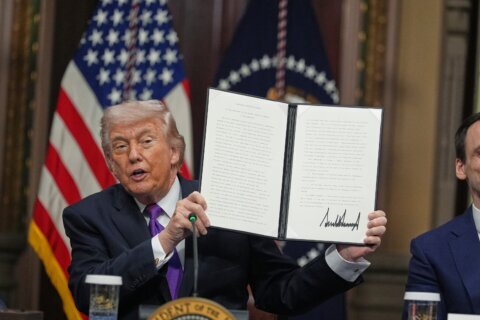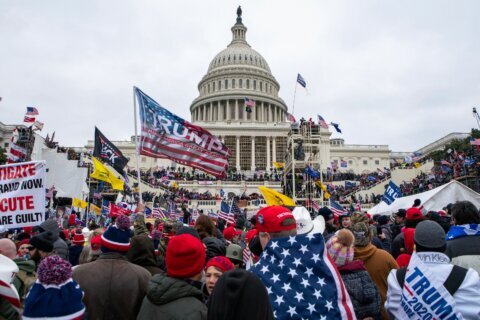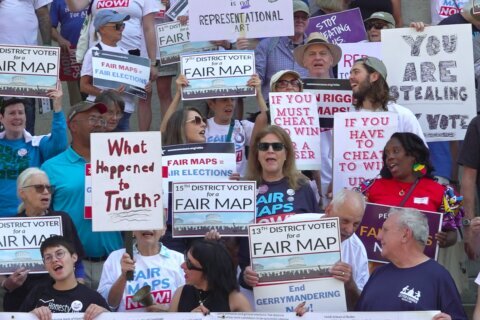While primary day in Virginia is June 8, most Republicans across the state will be picking their candidates in a different way this cycle: On Saturday, May 8, the Republican Party of Virginia will hold a convention.
And while a Republican convention isn’t new in Virginia, the party is doing things a bit differently during the pandemic. Rather than a central in-person location, GOP delegates will cast ballots for statewide candidates — governor, lieutenant governor and attorney general — in 39 locations around Virginia.
Most of the ballots will be cast in drive-through fashion, said state GOP chairman Richard Anderson.
Decentralized voting will allow for a lot more delegates, Anderson said — 53,324 delegates have been certified, whereas a normal in-person convention would have 8,000 to 10,000.
The party will be using ranked choice voting, in which delegates will list candidates in order of preference; at each step, if no candidate receives an outright majority, the last-place finisher is eliminated, and that candidate’s votes are reallocated to whomever those voters listed as their second preference.
That’s another adjustment for public health guidelines: “The beauty of ranked choice voting is that they don’t have to stay around like they would at a traditional assembled convention, and cast ballots using multiple pieces of paper,” Anderson said.
Ballots will be counted by hand by a team of about 80 people at the Marriott Hotel and Convention Center, in Richmond, with a representative from each of the 17 candidates for statewide office watching, “so they have eyes on everything we do.”
The candidates are:
Governor
- Glenn A. Youngkin
- Amanda Freeman Chase
- M. Kirkland “Kirk” Cox
- Peter Doran
- Sergio de la Pena
- Peter A. “Pete” Snyder
- Octavia L. Johnson
Lieutenant Governor
- Lance R. Allen
- Timothy D. “Tim” Hugo
- Maeve T. Rigler
- Glenn R. Davis Jr.
- Puneet Ahluwalia
- Winsome E. Sears
Attorney General
- C.L. “Chuck” Smith Jr.
- Jason S. Miyares
- Jack White
- Leslie Haley
Anderson said that, while it’s unlikely every delegate will show up, he wasn’t expecting such a total: “Surprised is not the word — amazed. I thought we would end up, tops, with maybe 30,000.”
He said he thought the number was so large for two reasons: “Because [delegates] don’t have to travel as far, I think that’s been an inducement for more people to sign up,” Anderson said.
“But I also think no one can deny that Republicans, when it comes to statewide office, have been in the wilderness since Bob McDonnell was elected (governor) in 2009. And I think Republicans are simply ready to start winning again. And so enthusiasm and energy is high. And that’s why you see so many people.”
He said the party held a similar distanced convention, with 12 locations, in August of last year, and 2,500 out of 3,500 registered delegates cast ballots.
“And that’s when I was elected as state party chair. And obviously, electing a state party chair is not nearly as sexy as nominating a governor, lieutenant governor and attorney general candidates. So it’s really pulled people out this year.”
Convention vs. primary
Anderson was forthright in acknowledging that the choice of a convention of registered delegates, rather than a primary election, in which all Virginia voters are eligible (although you can only vote in one primary), has been a point of contention for the party. He called it “an age-old tug of war.”
He said he thought the 80-member Central Committee would elect to have a primary, in which all registered voters are eligible (although you can only vote in one party’s primary) when they met in December, “but instead, the majority of them selected the convention at our first meeting to discuss nomination matters.”
As a longtime member of the house of delegates, Anderson said he preferred primaries “just simply because they bring more people out to participate.” If the GOP held a primary June 8 alongside the Democrats, he predicted, between 300,000 and 400,000 voters would show up.
“I’m comfortable with primaries; they’re much easier for the party — obviously, this is a lot of work,” Anderson said.
“But there’s also a number of people who want to assure that bona fide Republicans gather to nominate their candidates … the analogy I would draw is, the Kiwanis Club doesn’t invite the Lions Club in to help select their club president, if you know what I mean.”
He said the large field was also a consideration: “There were concerns that [with a primary] at the end of the day, someone would emerge as our governor nominee with no more than 30% of the votes, and that could handicap them in some way. … With ranked choice voting, we will have to run the ballots until we have a clear-cut winner with the majority meaning 50% plus.”
The state of the races
Anderson added that he was “very pleased in the lack of acrimony between the candidates for each of the three offices … now, obviously, each is drawing a contrast with their competitors in the race. But I just have not seen any scorched-earth stuff, which pleases me, because I think that makes it easier to rally around an eventual nominee.”
He acknowledged that “negative mail pieces … have come from these independent third-party groups that operate on their own, without consultation with either a party or a candidate … but the candidates themselves are very pleased with the way they’ve been playing with each other.”
“I think it’s very crucial that we stay … focused as a party and plan this thing down to every final detail so there’s a smooth process. What I want at the end … for instance, for governor, we got seven candidates; only one is going to get the nomination and six are not, and I want the six who don’t to walk away in the belief that the result is accurate, that it’s indisputable, that the nominee is legitimate.”
And once the candidates are picked, it is on to the general election in November, and the chance to break a 12-year losing streak.
“Politics is a pendulum business,” Anderson said. “And that pendulum swings back and forth. And in 2017, it swung very significantly for the Democrats. And then it continued swinging in 2019. And … I believe that pendulum is ready to swing back.”
He added, “What our party, and especially our candidates, have to do is wage effective campaigns where they underscore the bad policy decisions, from our perspective, that the Democrats have made. But it’s more than that. I think … our nominees have to really paint a vision of the future for why, should they be elected, life will be better for Virginians, and I believe that they will be able to do that.”
WTOP’s Nick Iannelli and The Associated Press contributed to this report.








